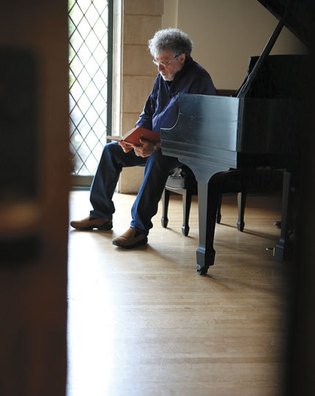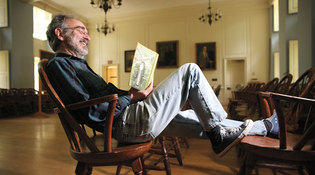 loading
loading
Guilty (and not-so-guilty) reads of the Yale facultyTraugott Lawler At Harvard Graduate School in the Sixties, I took an undergraduate lecture course on Romantic poetry from Douglas Bush. Speaking of Keats’s hands-on medical training, he said, “He was like Bob Sawyer in Pickwick Papers.” Then he asked the 75 of us how many had read Charles Dickens’s Pickwick Papers, and no one put up their hand but me. “Shame,” he said. “Funniest book in the language.” It is. I love going back to it.
Kirk Freudenburg This spring I lost an old friend, Kevin Herbert, a brilliant teacher and mentor of a young, and not so brilliant, me. Kevin was a “Superfort” tail-gunner in World War II, so, in pious memory of my old professor, I am reading his memoir, Maximum Effort: The B-29’s Against Japan.
Diana E. E. Kleiner What’s not to love about mysteries, chocolate, and a spunky heroine named Goldy Bear? I’m reading Diane Mott Davidson’s Dying for Chocolate, one of her many whodunits. Tantalizing clues keep readers guessing, and recipes for delectable desserts like “Lethal Layers” can be whipped up between chapters. You won’t be able to stop at one!
Stephen Roach Every generation has its claque of fear-mongering Luddites who always turn out to be wrong. Nicholas Carr fits that description perfectly, but with one important caveat—he may not be wrong. In The Glass Cage: Automation and Us, he shows that the computer and its seemingly spectacular applications may be taking more of a toll on the human species than we ever imagined. A dark tale well worth the read.
 Mark OstowMartin Bresnick View full imageMartin Bresnick My dear friend Veronica Tomasic ’01PhD lent me The Collected Stories of Isaac Babel. She knew that my mother, a storyteller herself, came from where the Babel tales are set and that I loved the short stories of Chekhov. Veronica suggested I begin with the “Red Cavalry Stories.” And when I finish the Beethoven biography by Jan Swafford ’82MusAD, a biography of Babel is next.
Eric Dufresne ’96 The historical novel An Officer and a Spy captured my attention like an engrossing mystery novel but enlightened me like the best nonfiction. Author Robert Harris provides an engaging first-person account of the Dreyfus affair, a pivotal moment in French history, from the perspective of one of its key players.
Anna Reisman ’86 Recently, I finished listening to the audio version of Stephen King’s novel Mr. Mercedes, and already miss Will Patton’s gravelly seen-it-all voice. It’s a perfect match both for complicated good guy Bill Hodges—retired small-town detective, overweight, and briefly suicidal—and bad guy Brady Hartsfield, computer tech and creepy ice-cream truck driver. Brady may live with his mother and kill the wrong person with poisoned hamburger meat intended for a dog, but he’s far from cliché. Suffice it to say that I didn’t mind getting stuck in traffic.
Jeffrey Brenzel Any collection by Alice Munro. If you need a catchy title for conversation starters, try Hateship, Friendship, Courtship, Loveship, Marriage. Munro’s area of expertise is the human soul, refracted in unforgettable short stories. She will make you breathe more deeply.
Jonathan Holloway ’95PhD I have been a fan of A. J. Jacobs since I ran across his book The Know-It-All: One Man’s Humble Quest to Become the Smartest Person in the World, on his (successful) attempt to read the Encyclopedia Britannica, all 33,000 pages. How could I resist when he published Drop Dead Healthy: One Man’s Humble Quest for Bodily Perfection? Jacobs’s efforts to fight the aging process caught my attention, partly because I’m older than he is and partly because he was an entertaining guest when I had him for a master’s tea at Calhoun six years ago. I won’t be aiming for perfection, but I do plan on enjoying the book while thinking about my next workout.
 Mark OstowShelly Kagan View full imageShelly Kagan Right now I am finishing up Sam Kean’s The Disappearing Spoon, which is a fascinating romp through the periodic table. Though the explanations of the strictly scientific bits are a bit thinner than one might like, the book is a wonderful collection of amazing and weird stories about the discovery of the elements. Science—real science—is a far cry from the dispassionate, linear march of reason one normally reads about in textbooks.
Heather K. Gerken This summer’s guilty pleasure will be rereading David Lodge’s Campus Trilogy—Changing Places, Small World, and Nice Work. Before I became a scholar, I used to love academic comedies of manners, like David Lodge’s books or Jane Smiley’s Moo. I always marveled at Lodge’s ability to make his characters just absurd enough to be funny. Now that I’m in the academy, I suspect he was just writing them straight.
Mark Reed Blind Man’s Bluff: The Untold Story of American Submarine Espionage is an intriguing and captivating look into the submarine cat-and-mouse warfare of the Cold War. The book, by Sherry Sontag and Christopher Drew, is a blend of history, technology, and intrigue, based on interviews from veteran submariners on both sides; it relates a series of stories that give the reader a feel for the men and machines of nuclear-superpower espionage. These stories bring to light one of the least-known conflicts of the modern era, and provide a fascinating read that will appeal to historians and technologists alike.
Dan Esty ’86JD Drinking Water: A History offers a sparkling review of the basic ingredient of all life. James Salzman ’85, a professor of law and environmental policy at Duke, traces the story of water from Rome’s aqueducts to modern-day battles over whether water should be managed as a priced commodity or offered for free as a human right. In a light and engaging style, Professor Salzman digs into the history, politics, engineering, and ethics of water. Full of insights and yet fun to read, Drinking Water will shed new light on every glass of H2O the reader picks up.
Margaret Grey ’76MSN I recently read All the Light We Cannot See, a Pulitzer Prize–winning book by Anthony Doerr. The book tells the stories of two youths growing up during World War II. One is a young German man, a talented radio technician who is drafted by the Nazis to work on their radios, and the other is the blind French daughter of a museum director who is taken by the Nazis. Their stories interact over time and the ending is a bit of a surprise. What I loved most is the reality of the characters and their youthful understanding (or not) of the ways of the world of war. As I am a pediatric nurse, their stories resonated with me.
|
|
3 comments
-

karl schrom, 1:46pm July 06 2015 |  Flag as inappropriate
Flag as inappropriate
-

walter gaffney, 5:10pm July 06 2015 |  Flag as inappropriate
Flag as inappropriate
-

Gwendolyn Soper, 12:04pm July 11 2015 |  Flag as inappropriate
Flag as inappropriate
The comment period has expired.I much enjoyed these diverse mentions and affectionate evocations, and have noted many titles to investigate;for instance, I hadn't even heard of Andrea Camillieri before. It was so refreshing to hear specialists not being specialists,just interested human readers over such a wide range of areas.
What a wonderful service to offer readers who are always seeking entertaining and interesting reads. The diverse titles could take me into areas I have consciously or unconsciously avoided. Thank you for enlightening my summer.
Someone had a terrific idea in compiling this, "Guilty Reads of the Yale Faculty". Kudos. I vote that you repeat this every summer.
It's nice to be reminded that Yale profs enjoy some down time with lighter reading fare, along with their ideas for recommended reading. Surely, we will give some of those books a try. My husband (Yale Law, '91), agrees with Traugott Lawler, who quoted a former teacher as saying, Pickwick Papers is the "funniest book in the language". I think I'll start with that one.